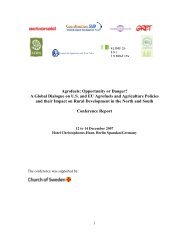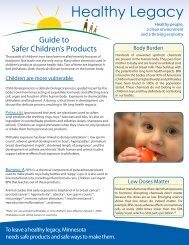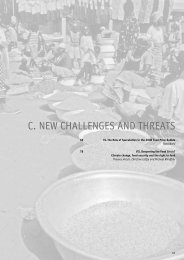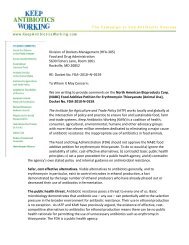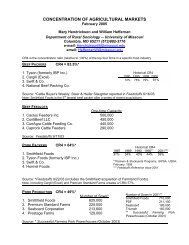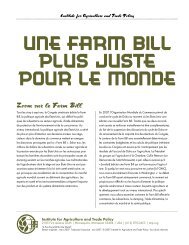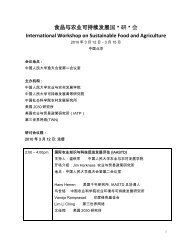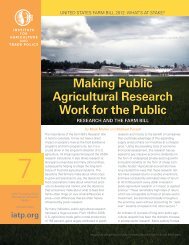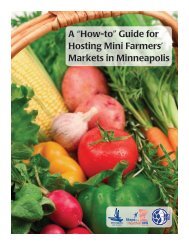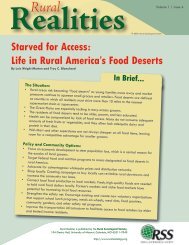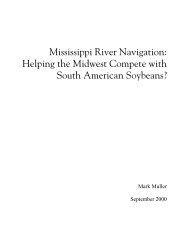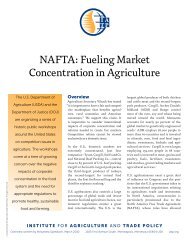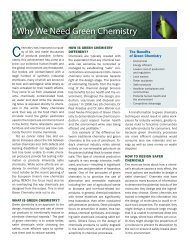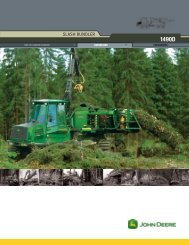IATP Hog Report - Institute for Agriculture and Trade Policy
IATP Hog Report - Institute for Agriculture and Trade Policy
IATP Hog Report - Institute for Agriculture and Trade Policy
You also want an ePaper? Increase the reach of your titles
YUMPU automatically turns print PDFs into web optimized ePapers that Google loves.
Section 1<br />
Rationale: Independent hog farmers are being squeezed out of the<br />
conventional pork market <strong>and</strong> increasingly end up providing<br />
packers "residual supplies." According to the L<strong>and</strong> Stewardship<br />
Project, 85 conventional processing plants owned by groups of<br />
farmers are not generally successful, but profitable niches exist <strong>for</strong><br />
small farmer-owned plants that offer specialty products, such as<br />
pork from particular breeds (e.g. Berkshires) or raised in<br />
conditions supportive of their natural behaviors or without<br />
antibiotics. Such opportunities allow farmers to add value to their<br />
own hogs, potentially comm<strong>and</strong>ing a higher price than packers<br />
would pay or that spot or cash markets would af<strong>for</strong>d.<br />
3. Support legislation that strengthens the definition of family farmer<br />
<strong>and</strong> prevents large, corporate "family farm" entities, such as<br />
Murphy Family Farms <strong>and</strong> Continental Grain, from operating in<br />
states with strong anti-corporate farming laws <strong>and</strong> benefiting from<br />
government programs <strong>and</strong> legislation geared toward helping farm<br />
families.<br />
Rationale: Family farms traditionally have been defined as farms<br />
under the ownership or control of the operator, with management<br />
<strong>and</strong> most of the daily labor input being provided by the operator<br />
<strong>and</strong> his or her family members. Government programs <strong>and</strong> policies<br />
designed to benefit family farmers are predicated on this<br />
description of family farms. Legal loopholes, however, allow<br />
corporate entities such as Murphy Family Farms, at one time the<br />
nation's largest hog producer, to qualify as family farms <strong>and</strong><br />
operate in states where other corporations cannot, <strong>and</strong> to take<br />
advantage of benefits originally designed to assist farm families<br />
living off the l<strong>and</strong>.<br />
4. Support small farmers ef<strong>for</strong>ts to regain control of their dollars that<br />
now go to m<strong>and</strong>atory "producer checkoff" programs.<br />
Rationale: Small farmers feel disadvantaged by the checkoff<br />
programs because the Boards they support channel checkoff<br />
dollars to research <strong>and</strong> promotion activities that primarily try to<br />
solve the problems associated with industrialized farming, which<br />
contributes to the growth of animal factories. Farmers should at<br />
least have the opportunity to vote on whether these checkoff<br />
programs should continue to exist. Not having to pay into existing<br />
m<strong>and</strong>atory checkoff programs also frees independent farmers'<br />
dollars to support programs that are more in their interest.<br />
5. Support legislation to strengthen current antitrust law <strong>and</strong> prevent<br />
anti-competitive practices in the livestock industry. Call <strong>for</strong><br />
stronger en<strong>for</strong>cement of existing antitrust laws.<br />
http://www.iatp.org/hogreport/sec1.html (15 of 23)2/27/2006 3:50:02 AM



